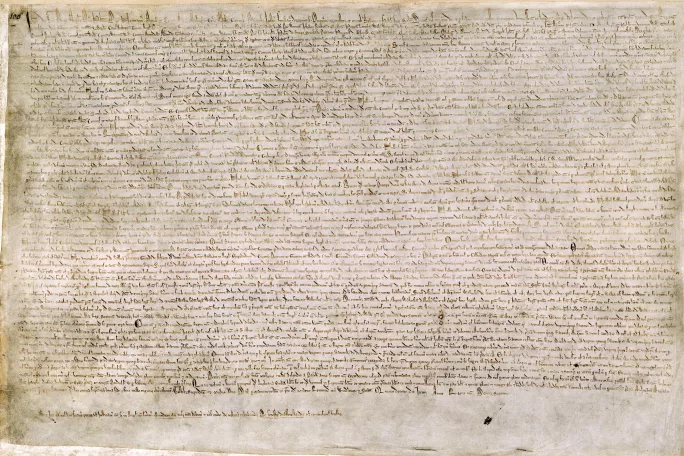Poem sheds light on Magna Carta
This week, the British Library revealed the earliest known independent account of the sealing of Magna Carta.
What’s it all about?
Researchers preparing for an exhibition to mark the 800th anniversary of Magna Carta at the British Library came across a contemporary account of the meeting at Runnymede when King John was forced to agree to a new relationship with the barons.
The poem is contained in the Melrose Chronicle, written by Cistercian monks in the 13th century, and includes a description of the negotiations that led to the sealing of the Great Charter.
What does it say?
Magna Carta, or the Great Charter, was forced onto a reluctant king by the barons, and guaranteed certain rights, including protection from illegal imprisonment and access to swift justice, in exchange for an oath of loyalty to the crown.
The poem, written in Latin, describes the extraordinary events that led to the sealing of Magna Carta, beginning: “A new state of things begun in England; such a strange affair as had never been heard; for the body wishes to rule the head, and the people desired to be masters over the king.”
It goes on to explain the grievances against King John that had led the barons to the brink of civil war.
“The king, it is true, had perverted the excellent institutions of the realm, and had mismanaged its laws and customs, and misgoverned his subjects,” it reads.
“His inclination became his law; he oppressed his own subjects; he placed over them foreign mercenary soldiers, and he put to death the lawful heirs, of whom he had obtained possession as his hostages, while an alien seized their lands.”
Why is the poem important?
The issuing of Magna Carta is considered one of the most important events in English history, and is widely viewed as marking the birth of civil liberties in the UK. However, the charter itself has been subject to endless interpretations and re-interpretations over the centuries, and enlisted in support of a range of different views.
The poem provides an independent account of the circumstances surrounding Magna Carta, and is sufficiently detailed that experts believe it was either written by somebody who was present or was taken directly from a witness.
A Scottish nobleman known to have been at Runnymede, where the charter was issued on 15 June 1215, has been identified by the British Library as the possible source.
In the absence of an official report on what happened, it is the closest we are likely to get to how the stand-off between king and barons was perceived at the time.
Questions for debate and discussion:
1. Why is Magna Carta seen as such a significant document?
2. Can you explain why there might be so many different versions of events?
3. This newly discovered source is a poem. What kind of sources do you think historians will refer to in the future?
4. The poem is presumed to be based on an account from a nobleman present at the signing. Which historical event would you like to have seen first-hand?
Related resources from TES
Magna Carta worksheet
Introduce the historical context behind Magna Carta with this visual worksheet.
Reporting from Runnymede
Students produce a news report that explores the reasons why Magna Carta was signed.
Magna Carta for EAL pupils
Break down Magna Carta for students with English as an additional language (EAL) using this matching sentence activity.
Magna Carta card sort
A recall task to check pupils’ understanding of the key features of Magna Carta.
Keep reading for just £1 per month
You've reached your limit of free articles this month. Subscribe for £1 per month for three months and get:
- Unlimited access to all Tes magazine content
- Exclusive subscriber-only stories
- Award-winning email newsletters




